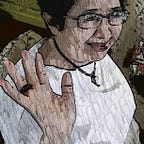Teaching Literature to Newbie
Why Read
In my country like elsewhere, people read books less and less. As a literature teacher, I hope I don’t exaggerate when I say not reading books is almost the cause of all social problems.
Reading books trains anyone to think logically and have ideas of their own. It’s hard for people to persuade readers if they don’t have a solid point.
But some people are non-readers not necessarily because they don’t want to read books. They don’t know where to start.
It’s hard for non-bookworm teens to pick up 300-page novel to read in their free time. They’d rather do something else.
A teacher’s duty is to make them choose books over other activities since spending time with books is better than spending times doing anything else in the world.
I’m excited every time I teach ‘Literature 101’. I’m very happy to meet new fresh faces looking askance at me as if they were waiting for me to show them, “C’mon. Show us what’s good in these books. We’re waiting.”
I can’t wait for the new semester to begin to teach this class. New faces from other majors fascinate me even more. Nothing is more satisfying than teaching people who choose to study how to read on their own.
Fright is also mixed with excitement.Teaching is both challenging and fearful. You hold the future readers in your hands. Will you blow the chance to have the future book lover or will you produce more bookworms?
Teaching newbie to read literature is not easy. It requires a lot of experience and patience because students don’t know a thing about how to read books. You need to explain them all the literary basics.
Reading literature is like playing a jigsaw puzzle. As you know, master writers “show” not “tell”. Students can’t expect writers or teachers to spoonfeed them all the information. They have to fill the missing pieces themselves.
Some see this as difficult and turn away, but some see it as fun and get hooked to the reading habit for the rest of their life. I’m on Cloud 9 when that happens.
One semester, we read a short story ‘Mr Know-All’ by W. Somerset Maugham. It’s just so fun to teach Maugham. Students also have a good time studying his short story. They enjoy learning about the unreliable first person narrator of ‘I’. They love Maugham’s plot intricacy.
Misreading, however, occurs among good students. In the short story, the protagonist’s name is Kelada. He’s a subject of King George of England. But the story hints us he’s a mediterranean by using a phrase, “He was born under a brighter sun than in England.” More than once the author calls him a Levantine, a person from Levant, a city on the Mediterranean.
The fact that this Kelada guy whose name sounds Japanese (?!) and heads for Japan for his pearl business doesn’t mean he is a Japanese. On the map, Japan is not on the Mediterranean. Neither Japan is a colonized country. Still in a quiz, most students answer Mr. Kelada is a Japanese business man.
In conclusion, teaching our young generation how to read is our indispensable mission. If taught well, readers will be a precious human asset. Reading is a source and a stepping-stone to all great things. All leaders are readers. Even followers who are readers are good followers. So, let’s put more reading courses on our college syllabi. Out world cannot do without readers.
Thanks for reading.
